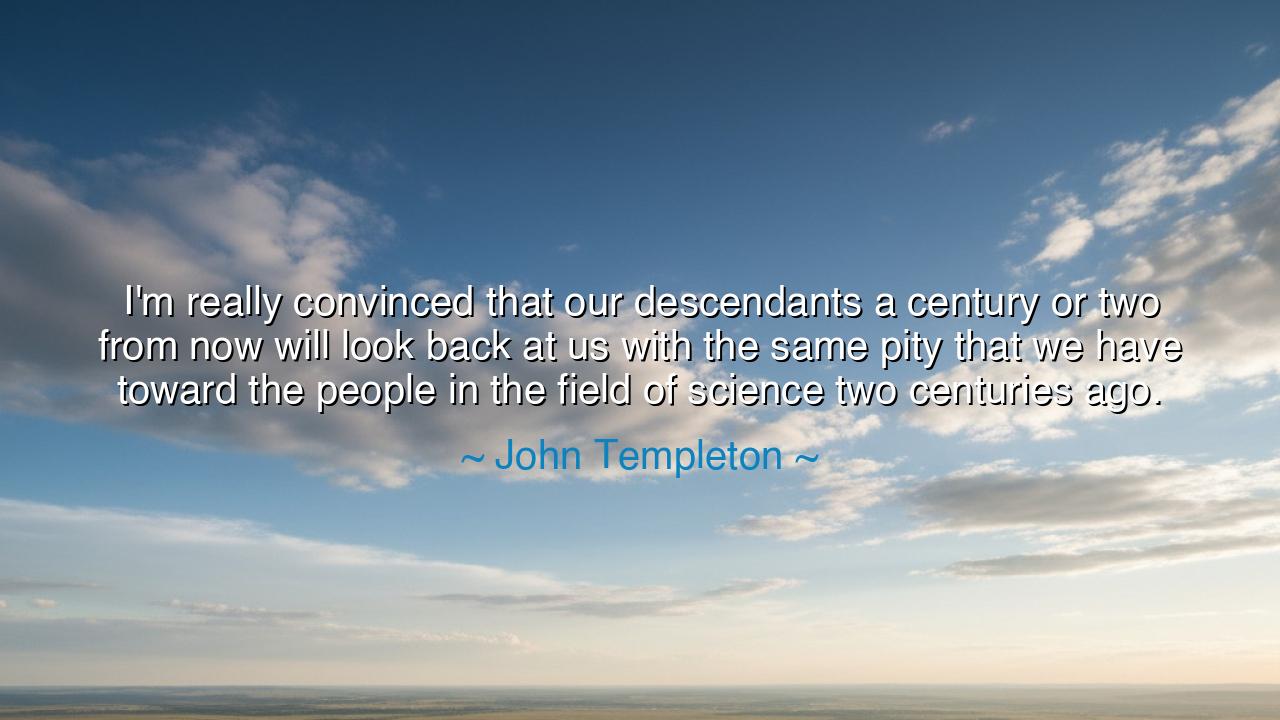
I'm really convinced that our descendants a century or two from
I'm really convinced that our descendants a century or two from now will look back at us with the same pity that we have toward the people in the field of science two centuries ago.






"I'm really convinced that our descendants a century or two from now will look back at us with the same pity that we have toward the people in the field of science two centuries ago." These words, spoken by the wise John Templeton, carry with them the weight of humility and a deep understanding of the progress of humanity. It is an acknowledgment that the knowledge we hold today, in all its complexity and sophistication, is but a fleeting step in the grand journey of human understanding. Just as we now look back upon the scholars of centuries past—those who, though brilliant, were shackled by the limited knowledge and tools of their time—so too will future generations look upon us with a mixture of compassion and amusement, knowing that our current understanding is but a small chapter in the ever-unfolding story of human discovery.
In the ancient world, Aristotle and his contemporaries sought to understand the very nature of the universe. They built philosophies of science, and yet, their theories—though profound for their time—were bound by the limitations of their era. They believed the Earth to be the center of the universe and proposed ideas about the natural world that, though groundbreaking in their day, were later proven to be incorrect. Yet, we do not look at Aristotle with scorn; instead, we honor his pursuit of knowledge, understanding that he laid the groundwork for future thinkers to challenge, refine, and surpass his ideas. His legacy is a testament to the truth that knowledge is ever-evolving, and no generation holds a monopoly on the truth.
Similarly, Galileo Galilei, often hailed as the father of modern science, lived in a world where the Church held dominion over knowledge. His discoveries, particularly those made with the telescope, challenged the established view of the cosmos. Yet, despite his brilliance, Galileo’s ideas were met with fierce resistance, for the truth he uncovered was beyond the capacity of many of his contemporaries to accept. In time, however, his observations were confirmed, and what was once heretical became the foundation of modern astronomy. Galileo’s story teaches us that the pursuit of truth often involves breaking free from the constraints of our current understanding and having the courage to question what is accepted as reality.
Templeton’s words remind us that we, too, are living in an age of limited understanding. Just as we now recognize the gaps and errors in the scientific knowledge of those who came before us, so too will future generations look at our ideas and marvel at how much we still had to learn. The scientific revolution is not a singular event but an ongoing process—one that continually shifts the boundaries of what we know, often in ways we cannot yet fully comprehend. Our current discoveries will someday be seen as stepping stones, humble beginnings in the grand timeline of human knowledge, which will continue to expand as we move forward.
Take, for example, Charles Darwin, whose theory of evolution revolutionized our understanding of the origins of life. In his time, Darwin’s ideas were met with resistance, and they were, in many ways, as controversial as they were revolutionary. Yet today, his theory is regarded as one of the most important scientific principles of modern biology. But even Darwin himself could not have anticipated the advances that would come in the centuries after his death. With the advent of genetics and the discovery of DNA, we now understand the mechanisms of evolution in ways that Darwin could not have imagined. His theory was the beginning, but it is only in the unfolding years that we are able to deepen and refine our understanding of the evolutionary process.
In our own time, we stand at the edge of new frontiers in science—in genetic engineering, artificial intelligence, and the cosmos. We are making strides, yes, but we must never lose sight of the fact that our knowledge, too, is limited by the tools, perspectives, and paradigms of our time. Just as Einstein’s theory of relativity shattered the understanding of Newtonian physics, there will come a day when Einstein’s own theories are seen as the foundation of an old era, soon to be surpassed by even greater revelations. As Templeton suggests, future generations will look at us with a sense of both admiration and pity—admiration for our contributions, but pity for the many limitations we could not yet overcome.
Templeton’s wisdom teaches us a humbling lesson: we are not the final arbiters of truth, and our understanding of the world is always incomplete. We must approach knowledge with humility, understanding that the truths we hold today will one day be surpassed, just as the theories of the past have been. This recognition should not lead to despair but should inspire us to pursue knowledge with even greater vigor and passion, knowing that our contributions are part of an ongoing story of discovery. The pursuit of knowledge is a journey, not a destination, and each step forward brings us closer to understanding the true nature of the world and our place within it.
As you walk the path of discovery, remember this lesson: that you, too, are a part of the unfolding story of human progress. Let your work be guided not by the desire to be the final authority, but by the understanding that you are laying the foundation for those who will follow. Honor the knowledge of those who came before you, but do not be afraid to challenge it. For it is only by questioning and seeking that we grow, that we evolve, and that we move ever closer to the truth.






AAdministratorAdministrator
Welcome, honored guests. Please leave a comment, we will respond soon